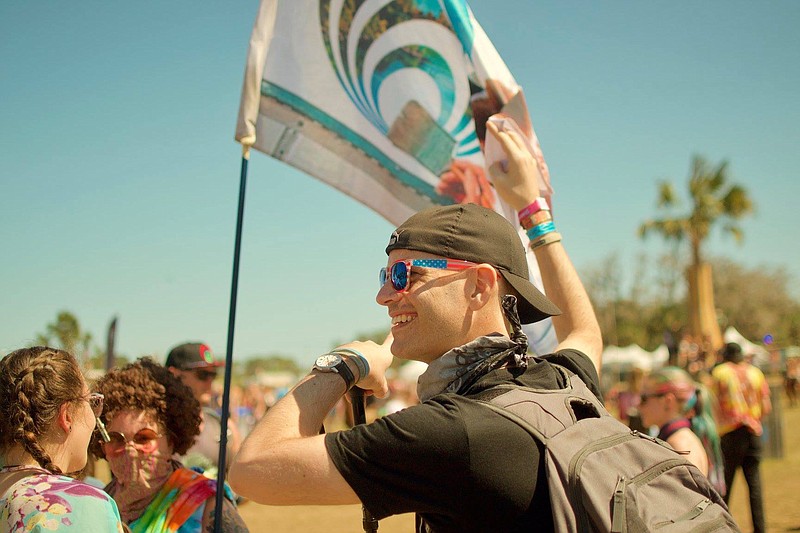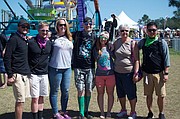Among the 36,000 people gathered at the 2018 Okeechobee Music & Arts Festival in southern Florida, Jason Egli was almost not one of them.
"God kept me around for a reason," the 35-year-old says.
Egli received Life Under the Wheel's 2018 grant to attend the festival. The nonprofit organization, co-founded in 2016 by a UTC graduate, sends individuals with life-threatening illnesses to music festivals.
In 2014, Egli, a Florida high school teacher, was diagnosed with stage 4 colorectal cancer - a form of cancer that in its later stage commonly spreads to the liver, then quickly throughout the body.
"Typically, people that get it don't stick around long," Egli says. His cancer, however, spread to his pelvis rather than his liver.
"Because it's bone cancer now, my bone is literally falling apart. I take a lot of pain medication just to function every day," says Egli.
The August before the festival, held in early March, the cancer caused a serious bacterial infection to spread throughout his body. He was rushed to the hospital where he underwent back-to-back emergency surgeries.
"As much as this cancer's been a plague, in a lot of ways it has been a blessing," Egli says. "What I've learned through all this is that the most important thing is the relationships you have with other people. Camaraderie, a sense of community - a music festival brings all that out."
Life Under the Wheel was founded by Tennessee locals Evan Gross and Elizabeth Pikaart. Gross and Pikaart met four years ago while working the festival circuit as independent contractors, taking tickets, shuttling bands or helping with visual design, among a myriad of other festival responsibilities. Pikaart is a full-time festival contractor, but for Gross, who also works as a political science adjunct instructor at the University of Tennessee at Chattanooga, the work is temporary, sometimes totaling just five days out of the year.
Still, it is nonetheless demanding.
"You might work 20-hour days during a festival. As amazing as our job is, it's still a job. You get jaded, stuck in mundane tasks," says Gross, who began to ask himself, "How can we make this work more fulfilling?"
One evening, while lying in bed, the idea for the nonprofit came to him. Over the next couple of weeks, Gross continued to brainstorm, settling on the name Life Under the Wheel, a reference to the Ferris wheels present at many music festivals. He shared his idea with Pikaart, who responded enthusiastically. "What can I do to help?" she immediately asked.
Because Gross and Pikaart already had established relationships with festival organizers and promoters, "Things happened a lot faster than we imagined," Gross says. They partnered with various festivals - Tennessee's Bonnaroo, Nevada's Life is Beautiful and Florida's Okeechobee, for example - which donated tickets and hotel rooms. Then, Gross and Pikaart launched fundraising campaigns, both through social media and at festivals.
A festival grant can cost up to $10,000, Gross says. Beyond just tickets for the grantee and a guest or caregiver, Life Under the Wheel covers travel, lodging and shuttling expenses for its recipients. Grantees may also have special needs such as limited mobility, requiring special services.
"Our vision is not just 'here's a ticket; enjoy the fest,'" Gross says. "We have a dedicated person on-site to be a concierge, to be whatever that person needs. These people spend their lives surrounded by hospitals. We want to give them distraction, a weekend to live."
Since its inception, Life Under the Wheel has provided two festival grants. The first went to Californian Calvin Huang, diagnosed with stage 4 glioblastoma, who attended the 2017 Life is Beautiful Music & Arts Festival in Las Vegas. The second went to Egli.
Recipients may be nominated or apply for the grant themselves. Huang applied for the grant himself; Egli was nominated by his mother. In order to qualify, nominees must be 18 years old and must be diagnosed with life-threatening illness.
They must also be able to demonstrate the importance music plays in their lives.
"Back in high school, I was a full-on jock," Egli says. "I played baseball and some basketball. I was supposed to be an up-and-coming pitcher. I had scouts looking at me in the 10th grade."
Then, at age 16, he had an accident on the basketball court in which he broke his neck, leaving him paralyzed from the neck down. It took Egli four years of surgeries and physical therapy to recover, though he never recovered enough to return to sports.
"I had no direction of where I was going. That's where music stepped in. I started playing guitar and it filled that void," he says.
"Music is not selfish. It's meant to be shared."
In part, this idea of a shared experience helped birth the modern-day music festival, Gross says.
"Festivals are now like micro-cities," says Gross. Bonnaroo, for example, attracts an average 80,000 attendees each year - thus increasing the population of Manchester, its host city, by 900 percent. "It's still about the music, but also about so much more," Gross says.
Egli calls it a once-in-a-lifetime experience.
"I don't mean just going to the festival. Anybody can do that," he says.
To illustrate his point, Egli recalls one bright-blue-skied afternoon during the Okeechobee music fest when the South Florida humidity was as sultry as the jazzy guitar riffs swirling from the stage. At the edge of the audience, a group of people pulled a playground parachute from a duffel bag. It spanned 30 feet in diameter and was striped in red, yellow and green. One by one, festival-goers moved to its edges. They lifted the silky fabric high over their heads while others moved beneath it. There, they took turns sharing stories about how music has helped them.
"Everyone just stops what they're doing and wants to participate. Nobody cares about your race, your sexuality, your politics," Egli says. "We were all there for one cause: for life. It will restore your faith in humanity. It will make you see there is so much good in the world."
The Power of Participation
To learn more about Life Under the Wheel or to nominate or apply for one of the grants, visit lifeunderthewheel.org. Submissions are accepted on an ongoing basis.

